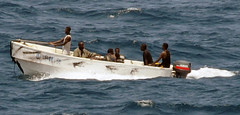
Somalian pirate boat patrolling the waters off the coast in the Horn of Africa. The US Navy killed three young Somali men in the Indian Ocean on April 12, 2009.
Originally uploaded by Pan-African News Wire File Photos
By Robert Wright, Transport Correspondent and Demetri Sevastopulo
Published: April 13 2009 19:14
Somalia’s pirates have been acting more nervously and co-operating unusually closely among themselves following Sunday’s killing of three pirates by US navy snipers and a French attack on a seized vessel, people involved say.
The changes suggest pirates fear further US military intervention and could increase the danger for seafarers in future incidents, according to some observers.
The three pirates were shot on Sunday as the US Navy rescued Richard Phillips, captain of the Maersk Alabama, from a drifting lifeboat. He had been held hostage since Wednesday after he handed himself to pirates in return for the release of his US-flagged container ship.
On Saturday, French special forces stormed the Tanit, a French yacht seized by pirates, killing one hostage and two pirates.
Pirates have seized four ships in the past week alone in the Indian Ocean off Somalia’s east coast. The area, which has seen more than half this year’s successful ship hijackings off Somalia, is far larger than the Gulf of Aden, off Somalia’s north coast, which saw the majority of last year’s attacks.
Stephen Askins, a partner at Ince & Co, London-based solicitors specialising in piracy, said there had been an undoubted increase in nervousness among Somalis negotiating over captured ships. “Key personnel are much more difficult to get hold of,” he said.
There were also signs of pirates moving ships away from their traditional anchorages off the town of Eyl, the main base for raiders from the northerly Darod clan, according to one western military analyst. “We saw a lot of ships anchored off Eyl but not as many now,” the analyst said.
The move could signify growing local resentment at the presence of pirates in the area, as well as growing nervousness of an onshore attack by US or other international forces on areas seen as pirate bases.
“Local populaces that used to support the pirates may be pushing back a little bit,” the analyst said.
Yet Abdi Garad, a pirate chief based in Eyl, told AFP they would now target American interests. “Next time we get American citizens I wish they will expect no mercy from us,” he said.
Groups that normally work in competition also appear to be co-operating in the face of the increased threat. Vessels hijacked both by the more southerly Hawiye clan and the Darod converged on the site of the Maersk Alabama stand-off in an attempt to lend support, both Mr Askins and the analyst said. “That demonstration was quite unusual,” Mr Askins said.
However, Mr Askins said pirates coming from desperately poor Somalia still had more to gain by continuing with attacks than they might lose from military intervention. “The risk-reward ratio still remains in the pirates’ favour,” he said.
The pirates’ chances of being caught are also lower in the Indian Ocean than in the smaller Gulf of Aden.
Vice-Admiral Bill Gortney, head of US naval forces in the Middle East and Horn of Africa, said on Sunday that in the Gulf of Aden it was possible to keep warships close enough to merchant ship routes to respond quickly to attacks.
“On the east coast of Somalia, such a vast area, we simply do not have enough resources in order to cover all those areas,” he said.
Future attacks might also be more violent following Sunday’s events. “This could escalate violence in this part of the world,” the Vice-Admiral said. “No question about it.”
The only good news is that with US-flagged merchant vessels rare and the US Navy far more numerous than others, pirates’ specific threats against US interests were probably hollow. “They absolutely don’t want a war with the United States,” the military analyst said.
Adm Gortney said the “ultimate solution” for tackling piracy was “on land”. He said US efforts to clamp down on piracy, including sending 130 pirates to the judicial system, had not reduced the number of attacks.
Robert Gates, US defence secretary, said on Monday there was “no purely military solution” to the problem, adding that the three pirates who were killed on Sunday were teenagers.
”As long as you’ve got this incredible number of poor people and the risks are relatively small, there’s really no way in my view to control it unless you get something on land that begins to change the equation for these kids,” Mr Gates said.
One defence official told the FT last week that the Pentagon would have to debate whether it needed to take military action inside Somalia, partly because of the difficulty in tackling the pirates at sea.
But a senior defence official said on Monday there were no plans to send commandos ashore to disrupt the pirate networks. He said there were “some pretty serious practical challenges” in dealing with the pirates, including “figuring out which of the thousands of dhows are actually pirate ships [or] vice fishing boats.”
Another military official said the US was “working hard within the interagency and with international partners to stem its steady rise”.
●Police said Somali insurgents fired mortars towards Donald Payne, a US congressman, as he left Somalia on Monday after a rare visit to the Horn of Africa nation by a US politician, reports Reuters in Mogadishu. US officials have shunned travel to the battle-scarred Somali capital. Omar Hashi Aden, Somali internal security minister, told Reuters Payne’s plane was airborne when the mortars fell. An African Union spokesman denied the attack on the airport – which is under AU control – had taken place.
Copyright The Financial Times Limited 2009
No comments:
Post a Comment